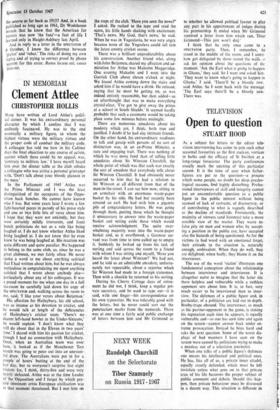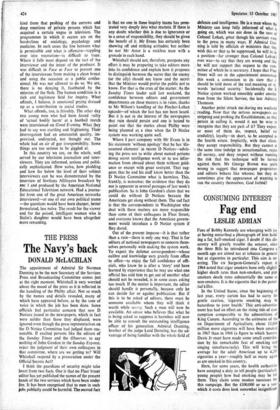Open to question
TELEVISION STUART HOOD
As a subject for letters to the editor tele- vision interviewing has come to join such other seasonal favourites as the first cuckoo, vortices in baths and the efficacy of St Swithin as a long-range forecaster. The party conferences usually mark the opening of this particular season. It is the time of year when father- figures are put to the question—a process which some people, no doubt for deep psycho- logical reasons, find highly disturbing. Profes- sional interviewers of skill and integrity cannot put an uncomfortable question to a public figure in the public interest without being accused of lack of restraint, of discourtesy, or of contributing to what is vaguely described as the decline of standards. Fortunately, the majority of viewers (and listeners) take a more sensible view of the matter. They waste no false pity on men and women who, by accept- ing a position in the public eve, have accepted also the hazards of being questioned. As for the victims (a bad word with an emotional tinge), their attitude to the situation is, naturally enough, ambivalent. When they do well, they are delighted; when badly, they blame it on the interviewer.
The use of the word 'victim' illustrates one fundamental conception about the relationship between interviewer and interviewee. It is altogether naive to imagine that the latter sits there helpless and vulnerable while a ruthless opponent sets about him. It is, in fact, very much easier to be interviewed than to inter- view. The defences of a public figure and, in particular, of a politician are laid out in depth. Booby-traps abound. The interviewer, as much as his partner-opponent in the game, is staking his reputation each time he appears, is equally vulnerable and—as one has seen time and again on the screen—cannot answer back under ex- treme provocation. Instead he bites hard and asks the next question. Some of the worst dis- plays of bad manners I have seen on the screen were caused by politicians trying to make a monkey out of a television journalist.
When one talks of a public figure's defences one means his intellectual and political ones. He has, like all of us, a private inner citadel, equally stoutly defended, which must be left inviolate unless what goes on in that private area of his life becomes the proper subject of public comment and debate. Should this hap- pen, then private behaviour must be discussed in a decent way. This situation is different ih
kind from that probing of the sorrows and deep emotions of private persons which has acquired a certain vogue in television. The programmes in which it occurs are on the borderlines of sociology, psychology and medicine. In such cases the line between what is permissible and what is offensive—toppling over into voyeurism—is difficult to trace. Where it falls must depend on the tact of the interviewer and the intent of the producer. It was difficult in Face to Face to prevent one of the interviewees from making a clean breast and using the occasion as a public confes- sional. He was not allowed to do so. We are, there is no denying it, fascinated by the miseries of the flesh. The human condition is a rich and legitimate field for inquiry. What offends, I believe, is emotional prying dressed up as a contribution to social studies.
What offends, too, is frivolity. The other day two young men who had been found .1.filty of 'actual bodily harm' at a football match were interviewed on Good Evening. What they had to say was startling and frightening. Their interrogation had an amateurish quality, im- provised, undirected, not thought out. The whole had an air of gay irresponsibility. Some things are too serious to be giggled at.
In this country we are, on the whole, well served by our television journalists and inter- viewers. They are informed, serious and politi- cally sophisticated. How naive, how plodding and how far below the level of their subject interviewers can be was demonstrated by the interview of Svetlana Alliluyeva broadcast by BBC 1 and produced by the American National Educational Television network. Had a journa- list from one of the great American networks interviewed—or one of our own political teams —the questions would have been sharper, better formulated, less naive. The result for the viewer and for the poised, intelligent woman who is Stalin's daughter would have been altogether more rewarding.



































 Previous page
Previous page